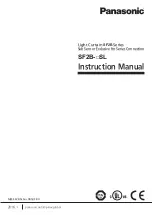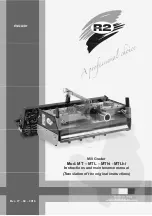
18
Instruction manual V 1.4 – 02/2007
4.
Startup
The feather key (
4
) is loosely placed in the
handwheel shaft (
1
) and fixed in place with a
tie-rap during transport.
•
Remove the cable tie (
3
). Caution!
Make sure not to lose the feather key!
•
Place the handwheel (
2
) on the handwheel
shaft (
1
) as shown.
•
Tighten the screw (
2a
) located in the center
hole of the handwheel with an Allen key
size 4 (
5
).
•
Remove the cover foil from the self-adhesive
cover disk and fix the cover disk on the
handwheel.
4.4 Assembling the handwheel
Fig. 11
The handwheel has to be assembled before attempting to use the instrument.
The necessary parts and tools can be found in the toolkit.
4.5. Electrical connections
The instrument MUST be connected to a grounded power socket. Use only the power cable
provided that matches the power supply (outlets) of the country of use. Do not use an
extension cable without a ground wire!
Before connecting the instrument to
the power supply, be absolutely
certain to check that the voltage
selector is set to the voltage in use in
your area!
Severe damage can be caused to the
instrument if the voltage selector is
set to an incorrect voltage!
Never change the setting of the
voltage selector while the instrument
is connected to the power supply.
Checking the voltage
The Leica RM2255 can be connected to various
electrical power grids (depending on voltage
and frequency) and, for this reason, is always
delivered with a set of various power cables.
New instruments are factory-set to 230 volts.
This is documented by a yellow label (
230 VOLT
)
on the rear of the instrument, which covers the
power switch and power socket.
2
5
2a
3
4
1
















































